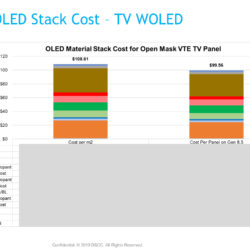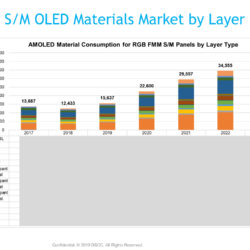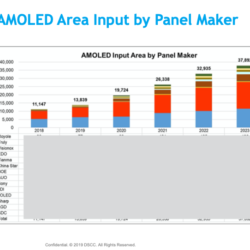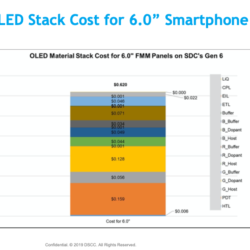Semi-Annual AMOLED Materials Report
Report Summary
This report tracks all OLED evaporation materials used in the production of AMOLED panels including Mobile/IT/TV & Other applications. it includes detailed stack diagrams for all the main configurations of AMOLED panels including White OLED/QD-OLED for TVs, RGB OLED for mobile devices, and tandem stacks for IT devices. Additionally, the report covers material suppliers and ASPs for these stack structures. OLED evaporation materials covered include small molecule and polymer emitter materials, and all common materials such as hole injection layers, hole transport layers, electron transport layers, block layers, and more. This report provides an overview of the current OLED evaporation materials market and offers insights into future trends based on this market information. It is combined with Counterpoint's deep knowledge of AMOLED capacity and panel shipments providing the industry's most accurate market size and market share results and forecasts. The report also includes a technology section that describes the main technologies behind AMOLED material performance, updates the latest developments and current technological issues. Furthermore, the report provides a scenario for the introduction of next-generation blue OLED emitters, covering the transition from fluorescent blue. In Excel format, market data for OLED evaporation materials (revenue and weight) is analyzed and simulated, providing market result and forecast data by materials, materials suppliers, panel makers, and configurations (applications and stack types) and more.
-
File Format
Excel (Market Data) + PDF (Analysis of Data) -
Published
Semi-Annual -
Order Report
Report Deliverables Include:
- AMOLED Stack Profiles and Cost
- Recent stack structures by major panel makers (Single, Tandem, WOLED, QD-OLED)
- History of stack structure by major panel makers
- Stack cost forecast by m2
- Supply chain matrix
- AMOLED Materials Technology Session
- AMOLED deposition (Evaporation, Ink-jet, OVPD)
- OLED stack architecture and issues (Tandem, WOLED, QD-OLED)
- OLED emitter technology
- Phosphorescent
- TADF & Hyper-fluorescence
- Deterium substitution
- CPL(Capping Layer)
- Ink-jet materials
- Other technology
- FMM-Less(eLeap, ViP)
- MLA
- COE
- Plasminic
- OPD(Organic Photo Detector)
- AMOLED Material Market Result and Forecast (2023-2028)
- AMOLED Input glass Area
- Material revenues and quantities segmented by:
- Application - mobile, IT, TV/Other
- Materials suppliers and panel makers
- Configurations – stack types, materials types, evaporation types
- Thickness and ASP by materials
- Materials Covered Include:
- OLED evaporation layers
- Small molecule/Polymer emissive materials (EML)
- Hole injection/transport materials (HIL/HTL)
- Electron injection/transport materials (EIL/ETL)
- Functional materials (Block layers, Prime HTL, CGL, etc.)
- OLED evaporation layers
Table of Contents
What’s Changed This Quarter (p.3 - 4)
Executive Summary (p.5 - 8)
Methodology for AMOLED Materials Estimates (p.9 - 12)
AMOLED Stack Profiles and Materials Costs (p.13 - 39)
-Stack configuration & thickness
-Cost per m2
-Cost for key products
Supply Chain Matrix by Materials Type (p.40 - 46)
Chinese OLED Materials Market (p.47 - 50)
Materials Revenue Forecast (p.51 - 67)
-Input Area
-All Applications
Supplier Revenues (p.68 - 74)
AMOLED Materials Technology (p.75 - 168)
Companies Mentioned
- AMAT
- Apeva
- AUO
- BOE
- Canon Tokki
- China Star
- Comet
- Doosan Solus
- Duk San Neolux
- DuPont
- EDO
- Heesung Metal
- Hodogaya
- Idemitsu Kosan
- Japan Display
- JOLED
- Kateeva
- Kyulux
- LG Chem
- LG Electronics
- LGD
- LT Materials
- Merck
- Noctiluca
- Novaled
- P&H Tech
- Qiadong
- Royole
- Samsung Display
- Samsung SDI
- SFC
- Sharp
- Solas OLED
- Sumitomo Chemical
- Summer Sprout
- Sunic Systems
- Tianma
- Toray
- Truly
- ULVAC
- Universal Display Corporation
- V Tech
- Visionox




